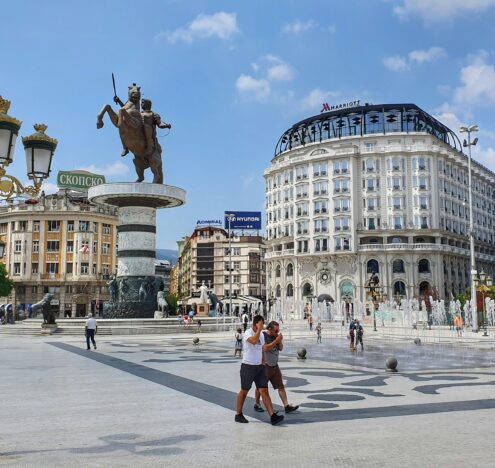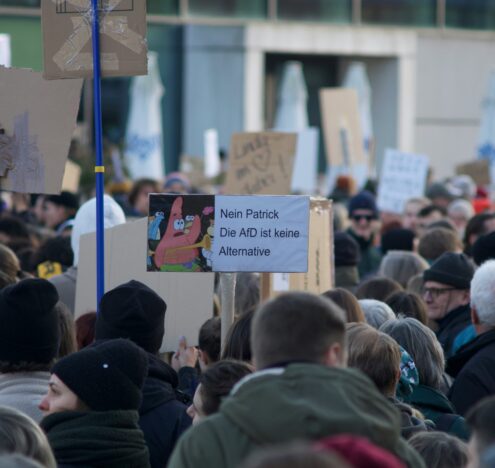“The Changing of a Continent” is a column by journalist Kenneth R. Rosen that focuses on the US trans-Atlantic relationship and Europe’s future.
The Northern League deputy Vito Comencini married Natalia Dandarova, a Russian national, in St. Petersburg in July 2019. After making several visits to the Donetsk separatist region in the Donbas region of Ukraine, known as the Donetsk People’s Republic, since 2015, the Italian parliamentary member now often defends the Russian invasion. Since March 2022, he has also made frequent trips to Russia. “They had already proclaimed themselves autonomous republics,” Commencini told La Repubblica. “Now, Putin has simply recognized them.”
Vito grew up in the Lega Giovani, formally known as Movimento Giovani Padani, a right-wing political party in his hometown of Verona. The city is a stone’s throw from my home in northern Italy and is the focal point of the Veneto-Russia Association, a quasi-outreach group that has, since the Russo-Ukrainian conflict began in 2014, become a veritable pipeline of support to the Donbas and Russia, more broadly. Trucks of humanitarian aid left Verona for the Donbas in 2015 and continue today.
Donbas exiles operate Bed and Breakfasts in Verona. “We are used to living with the background noise of a latent war,” one woman, who is from the Donbas and has lived in Italy since before the war began in 2014, told Corriere della Sera. “Now the volume has risen, but many are no longer willing to leave their homes with the risk of finding themselves with nothing left to return to.”
The calamitous European fallout of a collapsed Italian government is not assured, but it has not been avoided. On the contrary, it arrives at a precarious time.
The president of the First Commission in the Regional Council, Luciano Sandonà, also married a Russian national and often visits Veneto families who have resettled from the Donbas since the broader conflict began and, later, since February’s renewed invasion. And Luca Zaia, the right-wing governor of my fair Veneto region, is worried about the influence the “Russian experts,” as he calls them, have on the population and political winds more broadly. He means those in support of Ukraine.
Allegorically these support lines in the city of Verona speak to a broader, complex division across Italy while also serving to underscore the difficulties facing a Europe that still struggles to navigate the potential for a war spilling into its borders. Moreover, an ambiguous relationship with Russia has now come afore, with even the Russian Foreign Minister Sergey Lavrov given airtime on an Italian cable network to espouse Nazi conspiracy theories and antisemitism.
It further evidences the stake one country has in toppling the unification of the union, as what happens in Italy threatens the continent. Point of fact: Prime Minister Mario Draghi tendered his resignation after a parliamentary revolt on Jul. 14, 2022, for, in part, a package of legislation that would send weapons to Ukraine, triggering a collapse that may give renewed power to a domestic political party that might benefit Russia.
TO SUPPORT OR ADMONISH UKRAINE?
The techno-utopians sought to run Italy, a country known, at least across this continent, as the “sick man of Europe.”
Cries of democracy and universal basic income were met by pushback and calls that those efforts were no more than nuovo fascisimo. It was 2013 and the night of parliamentary elections came to a close with the rise of a party called the Five Star Movement (M5S). The young, tech-savvy politicians rallied behind Beppe Grillo, a comedian whose blog fan base eventually started organizing Meetup.com groups and unified under a singular ideology: complete disgust of Italian politics. Nothing worked. No one in power had sought the best for the country. It was a story about the explosive power the Internet still had, as late as 2013, to change the course of a country’s political atmosphere and policymakers.
Their slow demise started at their height. The colpo di grazia arrived earlier this month when the 35-year-old Minister of Foreign Affairs, Luigi Di Maio, who had once been a key supporter of the movement and within the party proper, announced he would start a new coalition. Why? The government’s undermining of efforts to support Ukraine against Russian forces who invaded the country in February. The party, which triumphed in the 2018 elections when it took 33% of the vote, according to Reuters, is now polling below 15%. Di Maio is now planning to take the technocratic leanings to back the current Prime Minister Mario Draghi in a new party called Insieme per il futuro.
His announcement meant that the pro-Putin Lega (remember its sister organization, Lega Giovani) party maintained the largest in parliament. But what well-meaning existed has now been quickly forgotten as the government virtually collapsed on Thursday, Jul. 14, with Di Mario’s former party, led by the ousted and bitter former Prime Minister Giuseppe Conte, revolting against the national unity government. The country, which under Draghi had seen relative calm and prosperity for the first time since the pandemic, remains weakened by two recessions, the European debt crisis (and perhaps a new one), and mired in disputes over migrant and refugees reaching its waters. Nevertheless, the country’s president refused to accept Draghi’s resignation, offering another five days of relative stability before Draghi speaks before parliament.
To anyone sitting on the sideline, Italian politics has become a theater for chicanery and comedy. So consumed are the parties by their own self-righteousness and infighting that they are willing to detonate the land for their nefarious ends rather than try to represent their own people in a meaningful way.
AN UNCERTAIN EUROPEAN FUTURE
The calamitous European fallout of a collapsed Italian government is not assured, but it has not been avoided. On the contrary, it arrives at a precarious time.
Draghi had sought to maintain the bloc’s unity against Moscow’s aggression, finding renewable and other energy sources apart from Russia, seeking further to distance the country from the Kremlin. Italy was the first major Western nation to announce its support of EU membership for Ukraine and has in the last few years stymied a populism backslide. But, with Lega holding the majority of parliament, a figure long forgotten on the global stage may once more find a foothold. Matteo Salvini, the nationalist former foreign minister and fervent supporter of Russian President Vladimir Putin, is once again relevant.
The supply routes from Veneto to the Donbas foreshadowed this tumult. Lega and Lega Giovani held on, if barely. A sleeping bear eventually wakes. And as with recent elections in France and Slovenia, the proximity to nationalistic flavors of governance has not been defeated. Infighting is a constant threat to the exact unity needed to preserve the bloc’s future.
Kenneth R. Rosen is a columnist at Inkstick and an independent journalist based in Italy.





















